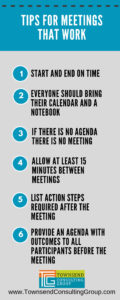
Content originally taken from eBella Magazine, “Meeting Makeover” by Kelly Townsend.
One of the biggest complaints I deal with when working with companies is people’s relationships to meetings. In the corporate world, managers consistently complain they can’t get anything done because they spend hours in unproductive meetings. No doubt, we’ve all been in meetings where we wondered whether anything got accomplished.
An online survey by Microsoft of 38,000 people in 200 countries, as published in HR Innovator (April, 2005), found:
•In the U.S. people work an average of 45 hours a week; they consider 16 hours as unproductive.
•In the U.S. people spend about 5.5 hours in meetings each week and 71% feel meetings are not productive.
•The top U.S. productivity pitfalls are procrastination (42%), lack of team communication (39%) and ineffective meetings (34%).
How could this be, when time is so precious to all of us in the 21st century? What we hear as consultants is that people have so much to do that they spend much of their time reacting to what comes up, rather than planning and creating their day. The speed and complexity of all the information coming at us in our non-stop world prevents us from getting it all done. We cannot get it all done.
As a leader and manager, it’s important that you’re leading the way. With this in mind, managers and leaders must find a way to schedule what I call ‘thinking and planning time’ in their calendar. Scheduling this planning period will save you time and help you generate meetings that are productive for everyone involved.

Create the Future
To create your meeting in the calendar, start by determining what you and your team have accomplished from the end of the outcome looking back. Imagine the future like Tiger Woods seeing a putt in his mind’s eye. You form a picture of how you want things to turn out if you had your way. Your statement should energize and focus the team, and have them looking forward to the accomplishment that lies ahead. Determine what members of your team will be accountable for as compelling openings for action. This establishes you as the author of the future, rather than a victim of it. You and your team will now own the result even before you take action.

A Meeting As An Outcome
It’s time to schedule a meeting as an outcome. To do this, it’s important to ask yourselves some questions, such as:
•Why are you having the meeting? What concern will it fulfill?
•What outcome do you want to realize and what has to be done for that to happen for everyone involved?
•Is there anyone whose absence will defeat your ability to produce the intended outcomes of the meeting? If so, should you reschedule the meeting?
•Do members of your team need to contribute something in order for you to realize the outcome? What do they need to do to before or during the meeting?
•What needs to happen for you to realize the outcome and accomplishment within 45 minutes?
•What will the Agenda say about what’s going to happen there?
By using the language of an outcome, you and your team will be able to focus your energy, attention and creativity to the project at hand. Knowing the outcome requires workers to consider what is needed in order to fulfill the outcome. It also creates a positive mental image of the future. By holding the group accountable, team members will be focused and energized on what lies ahead.



